Ward A.W. The Cambridge History of British Foreign Policy. 1783-1919. Volume 3
Подождите немного. Документ загружается.

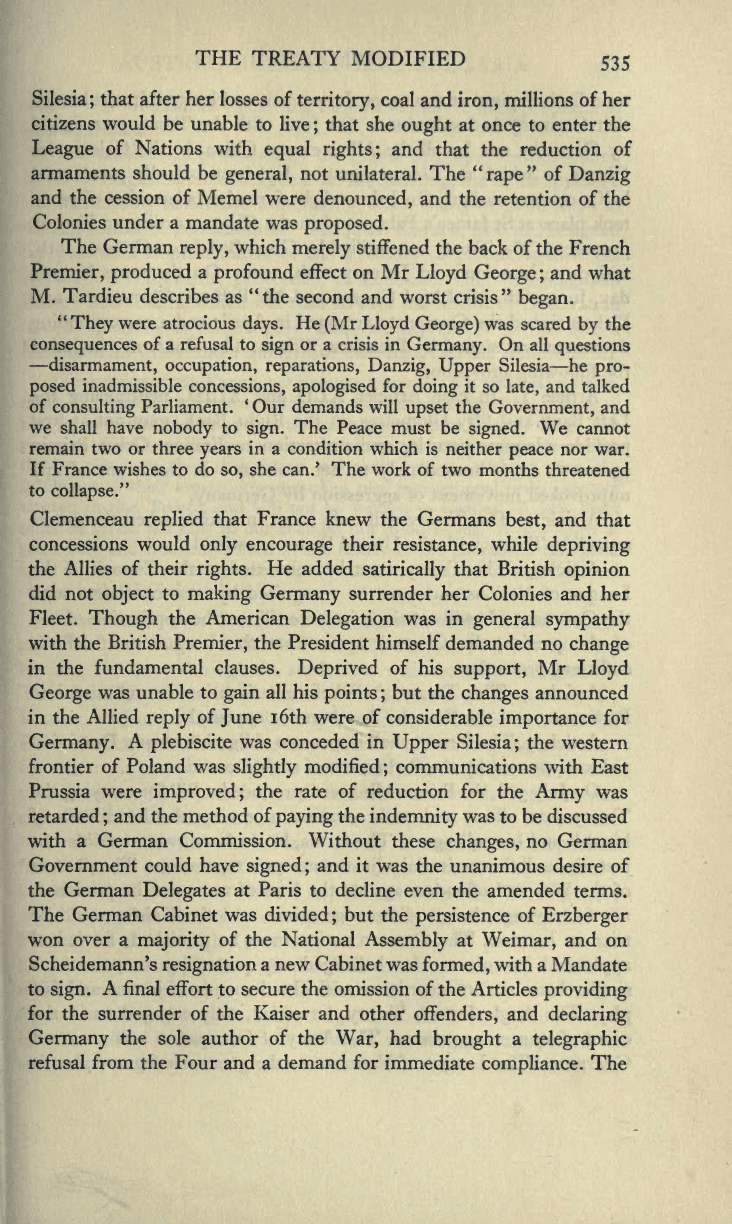
THE
TREATY
MODIFIED
535
Silesia;
that after her
losses of
territory,
coal and
iron,
millions
of
her
citizens
would
be
unable
to live
;
that
she
ought
at once to
enter the
League
of
Nations
with
equal rights;
and
that the reduction
of
armaments should be
general,
not
unilateral. The
"rape"
of
Danzig
and
the
cession of
Memel
were
denounced,
and
the
retention
of
the
Colonies under a
mandate was
proposed.
The German
reply,
which
merely
stiffened
the
back
of
the
French
Premier,
produced
a
profound
effect on Mr
Lloyd George
;
and what
M. Tardieu
describes as "the second and
worst crisis"
began.
"They
were atrocious
days.
He
(Mr
Lloyd
George)
was
scared
by
the
consequences
of a
refusal to
sign
or a
crisis
in
Germany.
On all
questions
—
disarmament,
occupation, reparations,
Danzig, Upper
Silesia
—
he
pro-
posed
inadmissible
concessions,
apologised
for
doing
it
so
late,
and
talked
of
consulting
Parliament.
'
Our demands
will
upset
the
Government,
and
we
shall have
nobody
to
sign.
The
Peace must be
signed.
We cannot
remain
two or
three
years
in a
condition which
is neither
peace
nor
war.
If France wishes to do
so,
she can/
The work of two
months threatened
to
collapse."
Clemenceau
replied
that
France
knew
the
Germans
best,
and
that
concessions would
only
encourage
their
resistance,
while
depriving
the
Allies
of
their
rights.
He added
satirically
that British
opinion
did
not
object
to
making
Germany
surrender
her Colonies and her
Fleet.
Though
the
American
Delegation
was in
general
sympathy
with the
British
Premier,
the
President himself demanded no
change
in the fundamental
clauses.
Deprived
of
his
support,
Mr
Lloyd
George
was unable to
gain
all his
points
;
but the
changes
announced
in the Allied
reply
of
June
16th were of
considerable
importance
for
Germany.
A
plebiscite
was conceded in
Upper
Silesia;
the western
frontier
of Poland was
slightly
modified
;
communications
with
East
Prussia were
improved;
the
rate
of
reduction
for
the
Army
was
retarded
;
and
the
method
of
paying
the
indemnity
was
to
be discussed
with
a German Commission.
Without these
changes,
no
German
Government
could have
signed;
and
it
was
the unanimous desire of
the
German
Delegates
at
Paris
to decline
even
the amended
terms.
The
German
Cabinet
was divided
;
but
the
persistence
of
Erzberger
won over
a
majority
of
the
National
Assembly
at
Weimar,
and on
Scheidemann's
resignation
a
new
Cabinet was
formed,
with
a
Mandate
to
sign.
A
final
effort to secure the omission of
the Articles
providing
for
the surrender of
the
Kaiser
and
other
offenders,
and
declaring
Germany
the sole
author
of
the
War,
had
brought
a
telegraphic
refusal
from
the
Four
and a demand for
immediate
compliance.
The
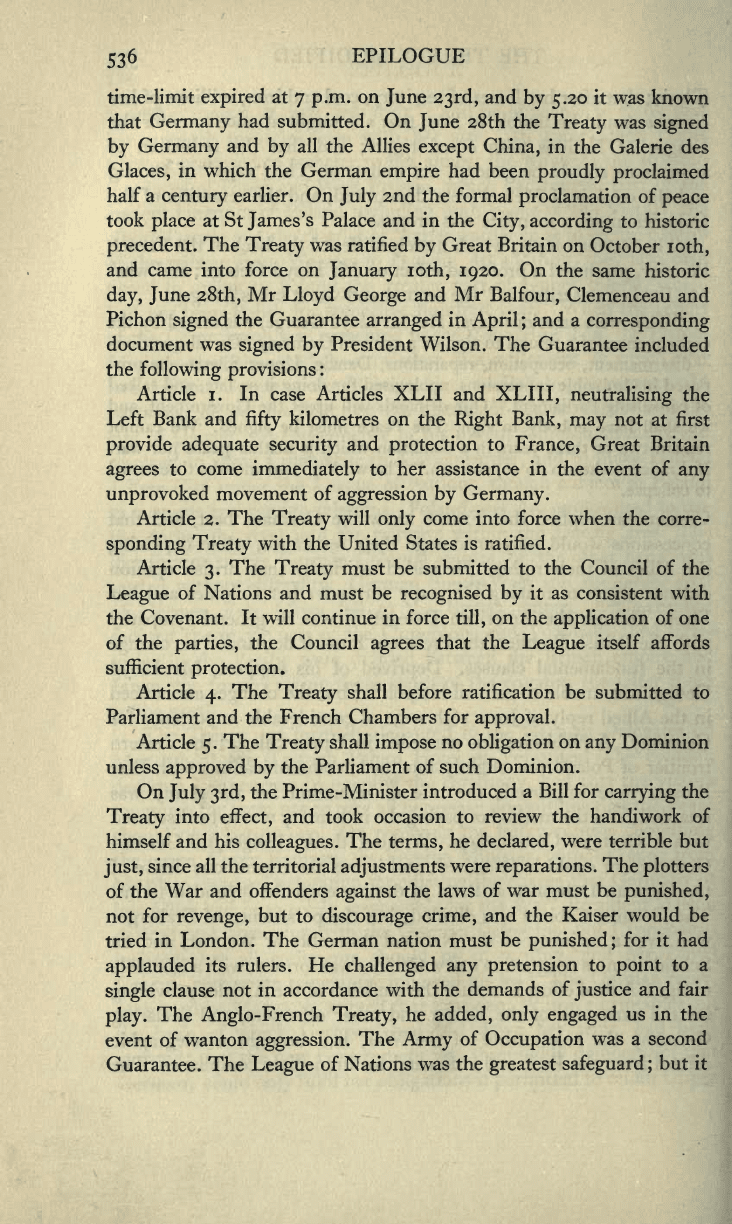
536
EPILOGUE
time-limit
expired
at
7
p.m.
on
June
23rd,
and
by 5.20
it was
known
that
Germany
had
submitted.
On
June
28th
the
Treaty
was
signed
by Germany
and
by
all the Allies
except
China,
in
the Galerie des
Glaces,
in
which the German
empire
had
been
proudly
proclaimed
half a
century
earlier. On
July
2nd
the formal
proclamation
of
peace
took
place
at St
James's
Palace
and in
the
City,
according
to
historic
precedent.
The
Treaty
was ratified
by
Great Britain on
October
10th,
and came into force
on
January
10th,
1920.
On
the
same
historic
day,
June
28th,
Mr
Lloyd George
and
Mr
Balfour,
Clemenceau and
Pichon
signed
the Guarantee
arranged
in
April
;
and a
corresponding
document
was
signed by
President
Wilson.
The
Guarantee included
the
following
provisions
:
Article
1.
In
case
Articles
XLII and
XLIII,
neutralising
the
Left
Bank
and
fifty
kilometres
on
the
Right
Bank,
may
not at
first
provide
adequate security
and
protection
to
France,
Great Britain
agrees
to
come
immediately
to
her
assistance
in
the
event
of
any
unprovoked
movement
of
aggression by Germany.
Article 2.
The
Treaty
will
only
come
into
force when
the
corre-
sponding
Treaty
with the United
States
is
ratified.
Article
3.
The
Treaty
must be submitted
to
the Council of
the
League
of
Nations
and
must
be
recognised
by
it
as
consistent with
the
Covenant.
It
will
continue
in
force
till,
on
the
application
of
one
of
the
parties,
the
Council
agrees
that
the
League
itself affords
sufficient
protection.
Article
4.
The
Treaty
shall before ratification be
submitted to
Parliament
and
the
French
Chambers for
approval.
Article
5.
The
Treaty
shall
impose
no
obligation
on
any
Dominion
unless
approved by
the Parliament
of such
Dominion.
On
July
3rd,
the Prime-Minister introduced
a Bill for
carrying
the
Treaty
into
effect,
and
took
occasion to
review the
handiwork of
himself
and his
colleagues.
The
terms,
he
declared,
were terrible
but
just,
since
all
the territorial
adjustments
were
reparations.
The
plotters
of
the
War and
offenders
against
the
laws
of war
must be
punished,
not
for
revenge,
but to
discourage
crime,
and
the Kaiser
would
be
tried
in
London.
The German nation must
be
punished
;
for
it
had
applauded
its
rulers. He
challenged
any
pretension
to
point
to
a
single
clause not
in
accordance with
the
demands of
justice
and fair
play.
The
Anglo-French
Treaty,
he
added,
only
engaged
us in
the
event
of
wanton
aggression.
The
Army
of
Occupation
was a second
Guarantee.
The
League
of
Nations
was the
greatest
safeguard
;
but
it
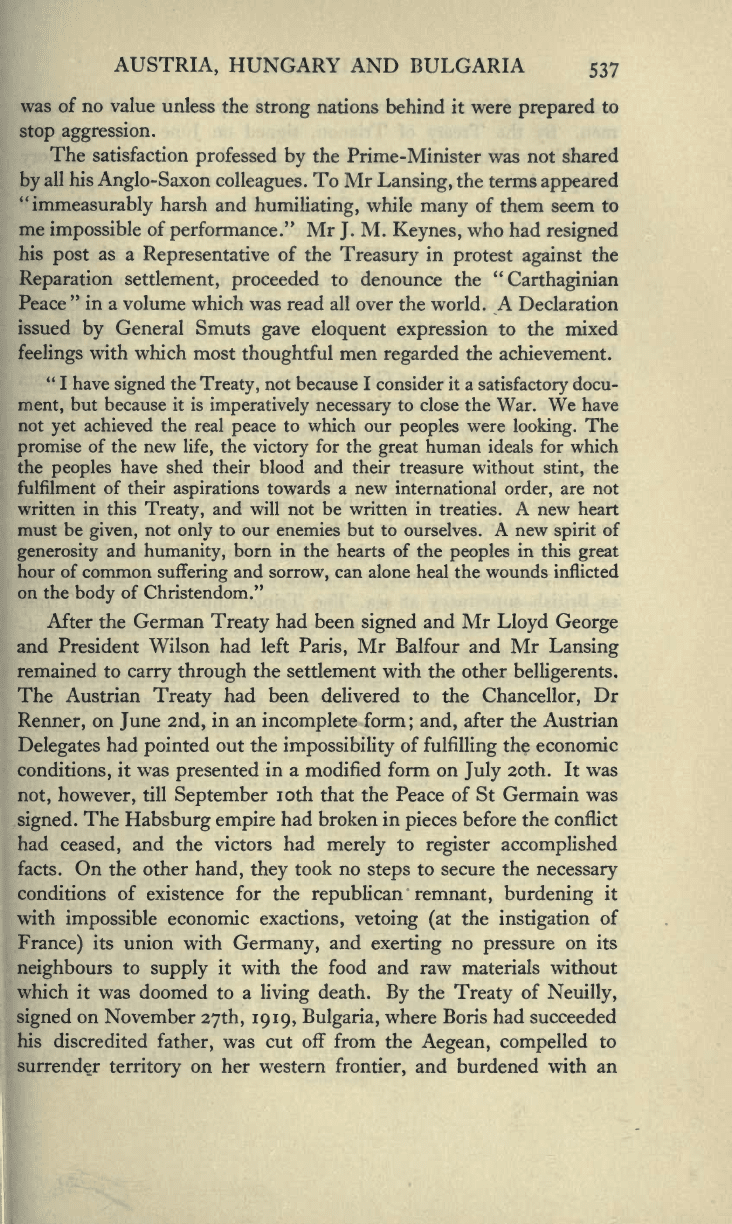
AUSTRIA,
HUNGARY
AND
BULGARIA
537
was of no
value
unless
the
strong
nations behind it
were
prepared
to
stop
aggression.
The satisfaction
professed
by
the
Prime-Minister
was
not
shared
by
all his
Anglo-Saxon
colleagues.
To
Mr
Lansing,
the terms
appeared
"immeasurably
harsh
and
humiliating,
while
many
of
them
seem
to
me
impossible
of
performance."
Mr
J.
M.
Keynes,
who
had
resigned
his
post
as a
Representative
of
the
Treasury
in
protest
against
the
Reparation
settlement,
proceeded
to denounce the
"Carthaginian
Peace
"
in
a
volume
which was
read all over
the world.
A
Declaration
issued
by
General
Smuts
gave eloquent
expression
to the
mixed
feelings
with
which
most
thoughtful
men
regarded
the achievement.
"
I
have
signed
the
Treaty,
not
because
I
consider it
a
satisfactory
docu-
ment,
but
because it is
imperatively necessary
to close
the War.
We have
not
yet
achieved the real
peace
to which
our
peoples
were
looking.
The
promise
of
the new
life,
the
victory
for
the
great
human
ideals
for which
the
peoples
have shed their
blood
and their
treasure
without
stint,
the
fulfilment
of
their
aspirations
towards
a
new international
order,
are not
written
in this
Treaty,
and
will not be written
in
treaties.
A
new
heart
must be
given,
not
only
to our
enemies but
to
ourselves.
A
new
spirit
of
generosity
and
humanity,
born
in
the hearts of the
peoples
in this
great
hour
of common
suffering
and
sorrow,
can alone
heal the wounds
inflicted
on
the
body
of
Christendom."
After the German
Treaty
had
been
signed
and Mr
Lloyd
George
and
President
Wilson had
left
Paris,
Mr Balfour
and
Mr
Lansing
remained to
carry
through
the settlement with the other
belligerents.
The Austrian
Treaty
had
been delivered to the
Chancellor,
Dr
Renner,
on
June
2nd,
in
an
incomplete
form; and,
after the
Austrian
Delegates
had
pointed
out the
impossibility
of
fulfilling
the
economic
conditions,
it
was
presented
in
a
modified
form on
July
20th.
It
was
not,
however,
till
September
10th that the Peace
of
St
Germain was
signed.
The
Habsburg
empire
had
broken
in
pieces
before
the
conflict
had
ceased,
and
the victors
had
merely
to
register
accomplished
facts.
On
the
other
hand,
they
took
no
steps
to secure the
necessary
conditions
of
existence
for
the
republican
remnant,
burdening
it
with
impossible
economic
exactions,
vetoing (at
the
instigation
of
France)
its union
with
Germany,
and
exerting
no
pressure
on
its
neighbours
to
supply
it with
the
food
and raw
materials
without
which
it was
doomed
to
a
living
death.
By
the
Treaty
of
Neuilly,
signed
on
November
27th,
19
19, Bulgaria,
where
Boris had succeeded
his
discredited
father,
was cut
off
from
the
Aegean,
compelled
to
surrender
territory
on
her western
frontier,
and
burdened
with
an
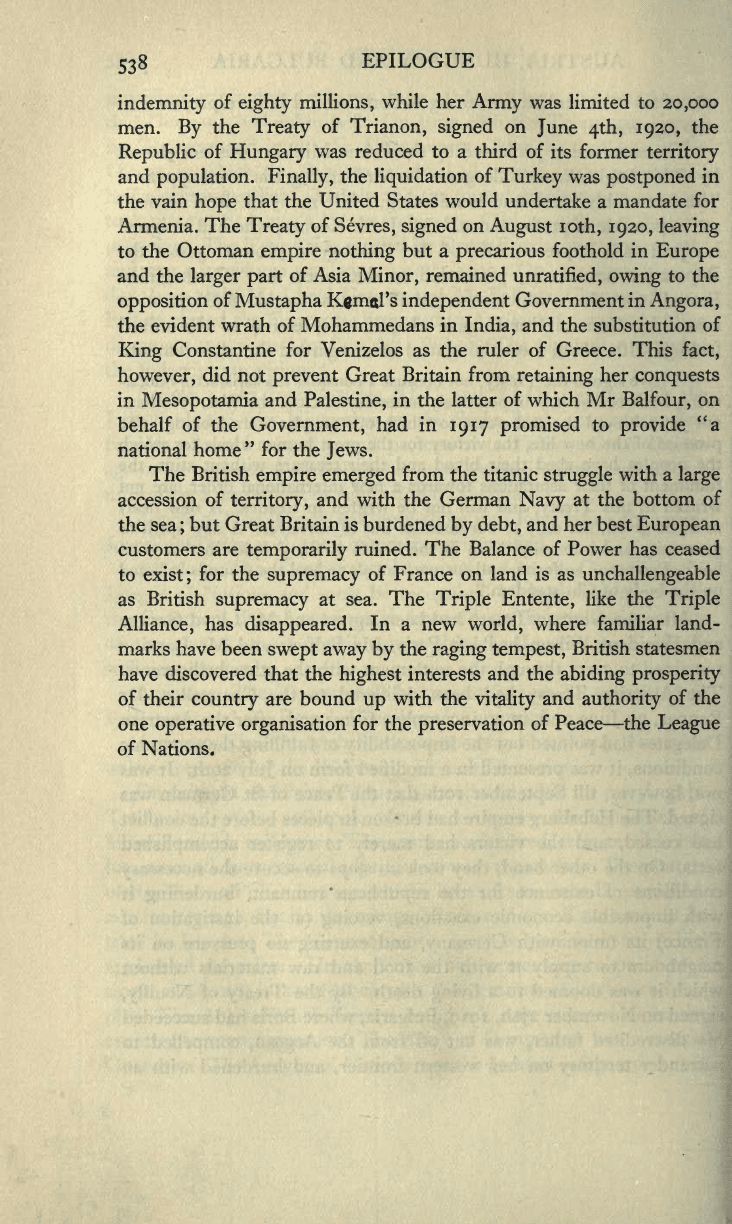
538
EPILOGUE
indemnity
of
eighty
millions,
while
her
Army
was limited to
20,000
men.
By
the
Treaty
of
Trianon,
signed
on
June
4th,
1920,
the
Republic
of
Hungary
was reduced to a third of
its
former
territory
and
population.
Finally,
the
liquidation
of
Turkey
was
postponed
in
the
vain
hope
that the United States
would
undertake a
mandate
for
Armenia.
The
Treaty
of
Sevres,
signed
on
August
10th,
1920,
leaving
to
the Ottoman
empire
nothing
but
a
precarious
foothold
in
Europe
and
the
larger
part
of Asia
Minor,
remained
unratified,
owing
to the
opposition
of
Mustapha
K^mal's
independent
Government
in
Angora,
the evident wrath
of Mohammedans in
India,
and
the substitution
of
King
Constantine
for Venizelos as the ruler
of
Greece.
This
fact,
however,
did
not
prevent
Great Britain
from
retaining
her
conquests
in
Mesopotamia
and
Palestine,
in
the latter
of
which Mr
Balfour,
on
behalf
of
the
Government,
had
in
19
17
promised
to
provide
"a
national
home
"
for
the
Jews.
The British
empire
emerged
from
the titanic
struggle
with a
large
accession
of
territory,
and with the German
Navy
at
the
bottom
of
the sea
;
but Great
Britain is
burdened
by
debt,
and her
best
European
customers
are
temporarily
ruined. The Balance of Power
has ceased
to
exist;
for
the
supremacy
of France
on land is as
unchallengeable
as
British
supremacy
at sea. The
Triple
Entente,
like
the
Triple
Alliance,
has
disappeared.
In
a new
world,
where
familiar
land-
marks have been
swept
away
by
the
raging
tempest,
British statesmen
have discovered that the
highest
interests
and
the
abiding
prosperity
of
their
country
are bound
up
with
the
vitality
and
authority
of
the
one
operative
organisation
for
the
preservation
of Peace
—
the
League
of
Nations.
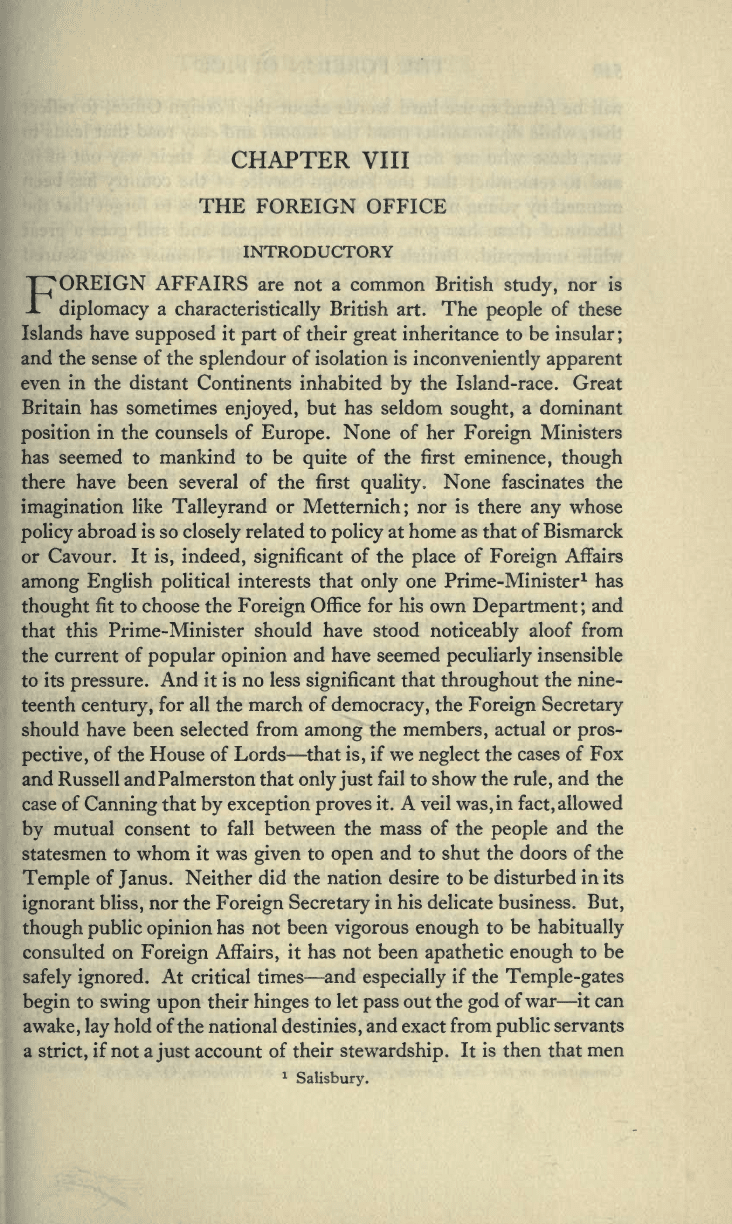
CHAPTER
VIII
THE
FOREIGN
OFFICE
INTRODUCTORY
FOREIGN
AFFAIRS
are
not
a common
British
study,
nor is
diplomacy
a
characteristically
British art.
The
people
of
these
Islands
have
supposed
it
part
of
their
great
inheritance to
be
insular
;
and
the sense
of
the
splendour
of
isolation
is
inconveniently apparent
even
in
the
distant Continents inhabited
by
the
Island-race.
Great
Britain
has
sometimes
enjoyed,
but
has seldom
sought,
a
dominant
position
in
the
counsels of
Europe.
None
of
her
Foreign
Ministers
has seemed
to
mankind
to
be
quite
of
the first
eminence,
though
there have been several of
the first
quality.
None
fascinates the
imagination
like
Talleyrand
or
Metternich;
nor is
there
any
whose
policy
abroad
is
so
closely
related to
policy
at home
as
that
of Bismarck
or Cavour.
It
is,
indeed,
significant
of the
place
of
Foreign
Affairs
among English
political
interests that
only
one
Prime-Minister
1
has
thought
fit to choose
the
Foreign
Office
for his own
Department
;
and
that this Prime-Minister
should
have stood
noticeably
aloof from
the
current
of
popular opinion
and
have
seemed
peculiarly
insensible
to
its
pressure.
And
it
is
no less
significant
that
throughout
the
nine-
teenth
century,
for
all
the
march of
democracy,
the
Foreign
Secretary
should have been selected
from
among
the
members,
actual or
pros-
pective,
of the House
of
Lords
—
that
is,
if
we
neglect
the
cases of Fox
and Russell
andPalmerston that
only
just
fail
to
show the
rule,
and
the
case of
Canning
that
by exception proves
it. A veil
was,
in
fact,
allowed
by
mutual
consent
to
fall
between
the
mass of the
people
and
the
statesmen to
whom
it
was
given
to
open
and
to shut
the
doors of the
Temple
of
Janus.
Neither
did the
nation
desire
to
be disturbed
in
its
ignorant
bliss,
nor
the
Foreign
Secretary
in his
delicate
business.
But,
though public opinion
has not
been
vigorous enough
to
be
habitually
consulted
on
Foreign
Affairs,
it
has
not been
apathetic
enough
to
be
safely ignored.
At
critical
times
—
and
especially
if
the
Temple-gates
begin
to
swing upon
their
hinges
to
let
pass
out
the
god
of war
—
it
can
awake,
lay
hold
of
the
national
destinies,
and
exact
from
public
servants
a
strict,
if
not
a
just
account
of
their
stewardship.
It
is then
that
men
1
Salisbury.
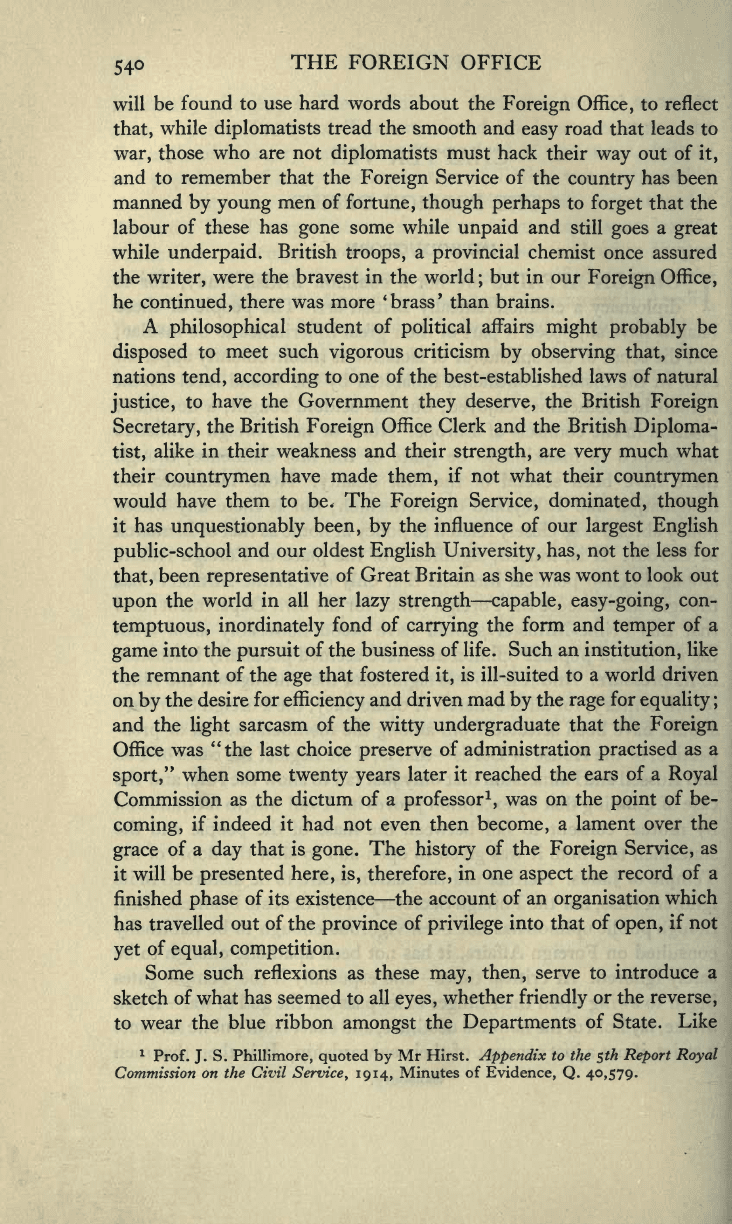
540
THE
FOREIGN
OFFICE
will be
found to
use hard words
about
the
Foreign
Office,
to reflect
that,
while
diplomatists
tread the smooth
and
easy
road
that
leads
to
war,
those
who are
not
diplomatists
must
hack
their
way
out
of
it,
and to
remember that the
Foreign
Service
of
the
country
has been
manned
by
young
men of
fortune,
though
perhaps
to
forget
that the
labour
of
these
has
gone
some
while
unpaid
and
still
goes
a
great
while
underpaid.
British
troops,
a
provincial
chemist
once assured
the
writer,
were the bravest
in
the
world;
but
in
our
Foreign
Office,
he
continued,
there
was more
'
brass
'
than
brains.
A
philosophical
student
of
political
affairs
might
probably
be
disposed
to
meet such
vigorous
criticism
by observing
that,
since
nations
tend,
according
to one
of
the
best-established
laws of
natural
justice,
to
have
the Government
they
deserve,
the British
Foreign
Secretary,
the
British
Foreign
Office
Clerk
and
the
British
Diploma-
tist,
alike in
their
weakness and
their
strength,
are
very
much
what
their
countrymen
have
made
them,
if
not
what their
countrymen
would have them to be. The
Foreign
Service,
dominated,
though
it
has
unquestionably
been,
by
the
influence
of
our
largest English
public-school
and our
oldest
English University,
has,
not
the
less
for
that,
been
representative
of
Great
Britain as
she
was
wont to
look
out
upon
the
world
in all her
lazy
strength
—
capable, easy-going,
con-
temptuous,
inordinately
fond of
carrying
the
form
and
temper
of
a
game
into
the
pursuit
of
the
business
of
life.
Such an
institution,
like
the
remnant
of
the
age
that fostered
it,
is
ill-suited to
a world driven
on
by
the
desire
for
efficiency
and driven
mad
by
the
rage
for
equality
;
and the
light
sarcasm
of
the
witty undergraduate
that
the
Foreign
Office
was "the last
choice
preserve
of
administration
practised
as a
sport,"
when
some
twenty
years
later it
reached the
ears
of a
Royal
Commission
as
the
dictum
of a
professor
1
,
was on
the
point
of be-
coming,
if indeed it had not even
then
become,
a
lament
over
the
grace
of a
day
that
is
gone.
The
history
of
the
Foreign
Service,
as
it will
be
presented
here,
is,
therefore,
in
one
aspect
the
record
of a
finished
phase
of
its existence
—
the
account
of an
organisation
which
has
travelled
out
of
the
province
of
privilege
into that
of
open,
if
not
yet
of
equal,
competition.
Some such
reflexions as
these
may,
then,
serve
to introduce
a
sketch
of what
has
seemed
to
all
eyes,
whether
friendly
or
the
reverse,
to
wear the
blue
ribbon
amongst
the
Departments
of State.
Like
1
Prof.
J.
S.
Phillimore,
quoted
by
Mr Hirst.
Appendix
to
the
5th
Report Royal
Commission on the
Civil
Service,
1914,
Minutes
of
Evidence,
Q.
40,579.
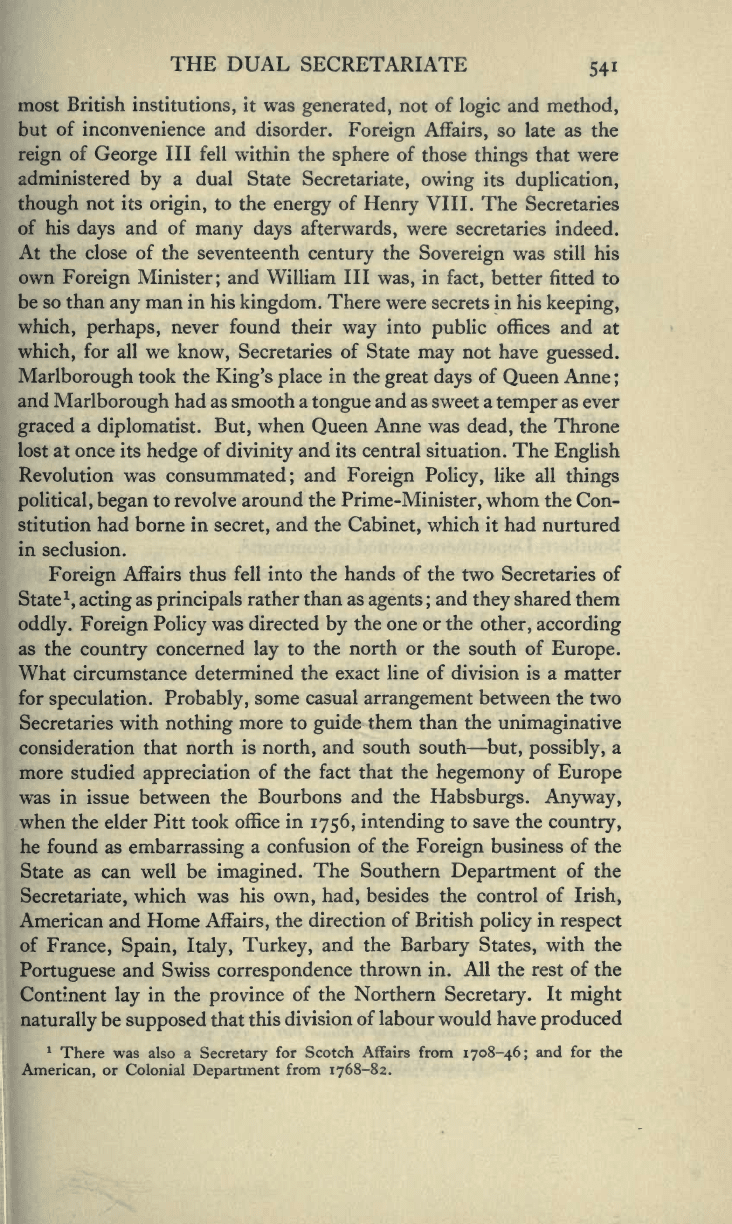
THE
DUAL
SECRETARIATE
541
most British
institutions,
it was
generated,
not
of
logic
and
method,
but
of
inconvenience and
disorder.
Foreign
Affairs,
so
late
as
the
reign
of
George
III
fell
within the
sphere
of
those
things
that
were
administered
by
a dual
State
Secretariate,
owing
its
duplication,
though
not its
origin,
to the
energy
of
Henry
VIII.
The Secretaries
of
his
days
and
of
many
days
afterwards,
were
secretaries indeed.
At
the close
of
the
seventeenth
century
the
Sovereign
was
still his
own
Foreign
Minister;
and William III
was,
in
fact,
better
fitted to
be so than
any
man
in his
kingdom.
There
were
secrets
in
his
keeping,
which,
perhaps,
never found
their
way
into
public
offices
and
at
which,
for
all we
know,
Secretaries
of
State
may
not
have
guessed.
Marlborough
took
the
King's
place
in
the
great days
of
Queen
Anne
;
and
Marlborough
had as
smooth
a
tongue
and
as
sweet
a
temper
as ever
graced
a
diplomatist.
But,
when
Queen
Anne was
dead,
the
Throne
lost
at
once
its
hedge
of
divinity
and
its
central
situation.
The
English
Revolution
was
consummated;
and
Foreign Policy,
like all
things
political,
began
to revolve
around
the
Prime-Minister,
whom
the Con-
stitution
had
borne
in
secret,
and
the
Cabinet,
which
it
had
nurtured
in
seclusion.
Foreign
Affairs
thus
fell into
the
hands of
the
two
Secretaries
of
State
1
,
acting
as
principals
rather
than
as
agents
;
and
they
shared
them
oddly. Foreign Policy
was
directed
by
the one
or the
other,
according
as
the
country
concerned
lay
to
the north
or
the
south
of
Europe.
What
circumstance
determined the
exact
line of
division is
a
matter
for
speculation. Probably,
some
casual
arrangement
between
the
two
Secretaries
with
nothing
more to
guide
them
than
the
unimaginative
consideration
that
north
is
north,
and
south south
—
but,
possibly,
a
more
studied
appreciation
of
the fact that the
hegemony
of
Europe
was in
issue between
the
Bourbons
and
the
Habsburgs. Anyway,
when
the elder Pitt took
office
in
1756, intending
to save
the
country,
he found as
embarrassing
a confusion
of
the
Foreign
business of
the
State as can well be
imagined.
The Southern
Department
of the
Secretariate,
which was
his
own,
had,
besides
the control
of
Irish,
American and
Home
Affairs,
the direction
of
British
policy
in
respect
of
France,
Spain,
Italy,
Turkey,
and the
Barbary
States,
with the
Portuguese
and Swiss
correspondence
thrown in.
All
the rest
of
the
Continent
lay
in
the
province
of
the Northern
Secretary.
It
might
naturally
be
supposed
that
this
division
of
labour would have
produced
1
There was also a
Secretary
for Scotch
Affairs
from
1708-46;
and
for the
American,
or
Colonial
Department
from
1768-82.
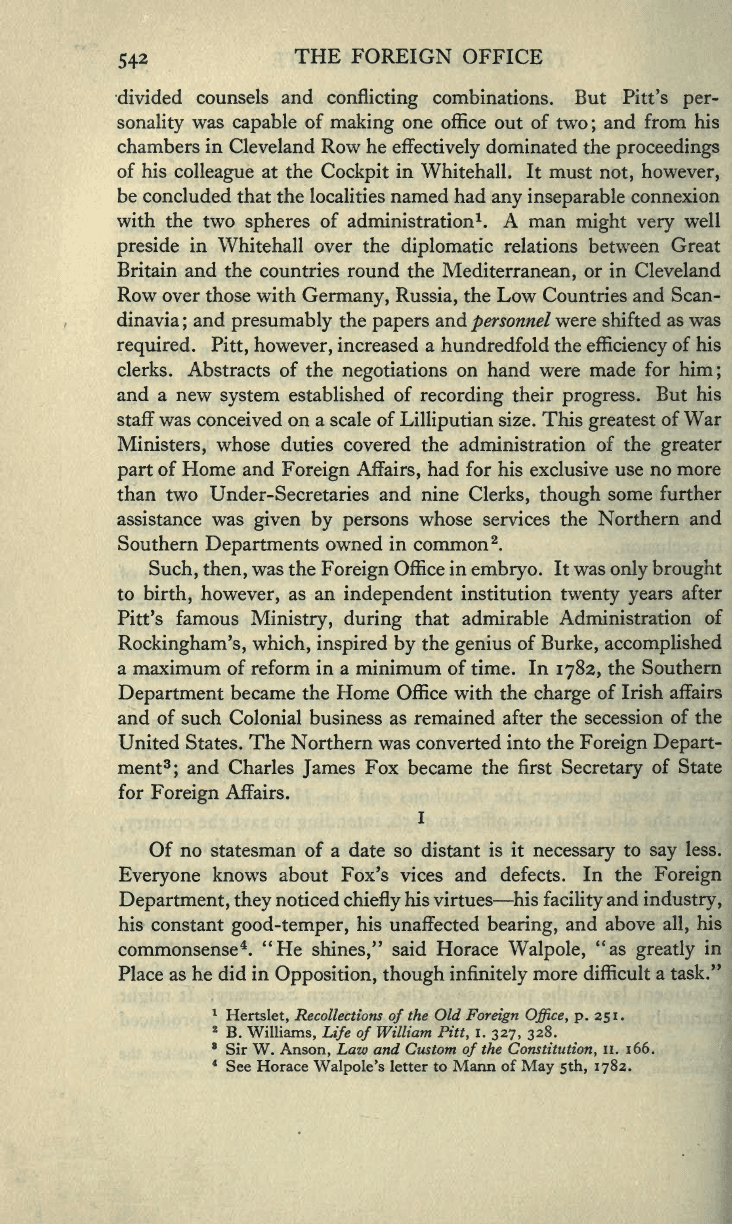
542
THE FOREIGN
OFFICE
divided counsels
and
conflicting
combinations. But Pitt's
per-
sonality
was
capable
of
making
one
office
out
of
two
;
and
from his
chambers in
Cleveland Row he
effectively
dominated
the
proceedings
of
his
colleague
at the
Cockpit
in
Whitehall. It
must
not,
however,
be
concluded
that
the
localities
named had
any
inseparable
connexion
with
the two
spheres
of
administration
1
. A man
might
very
well
preside
in
Whitehall
over
the
diplomatic
relations between
Great
Britain
and
the countries
round
the
Mediterranean,
or in Cleveland
Row
over
those with
Germany,
Russia,
the
Low Countries
and
Scan-
dinavia
;
and
presumably
the
papers
and
personnel
were
shifted
as
was
required.
Pitt, however,
increased a
hundredfold
the
efficiency
of
his
clerks.
Abstracts
of
the
negotiations
on hand were
made
for
him;
and a
new
system
established of
recording
their
progress.
But
his
staff was
conceived
on a
scale
of
Lilliputian
size.
This
greatest
of
War
Ministers,
whose
duties
covered
the administration
of the
greater
part
of Home
and
Foreign
Affairs,
had for his
exclusive
use no
more
than two Under-Secretaries
and
nine
Clerks,
though
some
further
assistance was
given by
persons
whose services
the
Northern
and
Southern
Departments
owned in
common
2
.
Such, then,
was the
Foreign
Office
in
embryo.
It
was
only
brought
to
birth, however,
as an
independent
institution
twenty
years
after
Pitt's
famous
Ministry, during
that
admirable
Administration
of
Rockingham's,
which,
inspired by
the
genius
of
Burke,
accomplished
a maximum of
reform
in a minimum
of
time.
In
1782,
the
Southern
Department
became
the
Home
Office with the
charge
of
Irish
affairs
and of such Colonial business as
remained after the
secession
of the
United States.
The
Northern
was
converted into
the
Foreign
Depart-
ment
3
;
and Charles
James
Fox
became
the
first
Secretary
of State
for
Foreign
Affairs.
I
Of
no
statesman of a
date
so
distant
is
it
necessary
to
say
less.
Everyone
knows
about
Fox's
vices
and defects.
In
the
Foreign
Department, they
noticed
chiefly
his
virtues
—
his
facility
and
industry,
his
constant
good-temper,
his
unaffected
bearing,
and above
all,
his
commonsense
4
. "He
shines,"
said Horace
Walpole,
"as
greatly
in
Place
as he
did in
Opposition, though
infinitely
more
difficult
a
task."
1
Hertslet,
Recollections
of
the
Old
Foreign Office,
p.
251.
2
B.
Williams,
Life
of
William
Pitt,
I.
327, 328.
3
Sir W.
Anson,
Law and
Custom
of
the
Constitution,
11.
166.
4
See Horace
Walpole
's letter to
Mann of
May 5th,
1782.
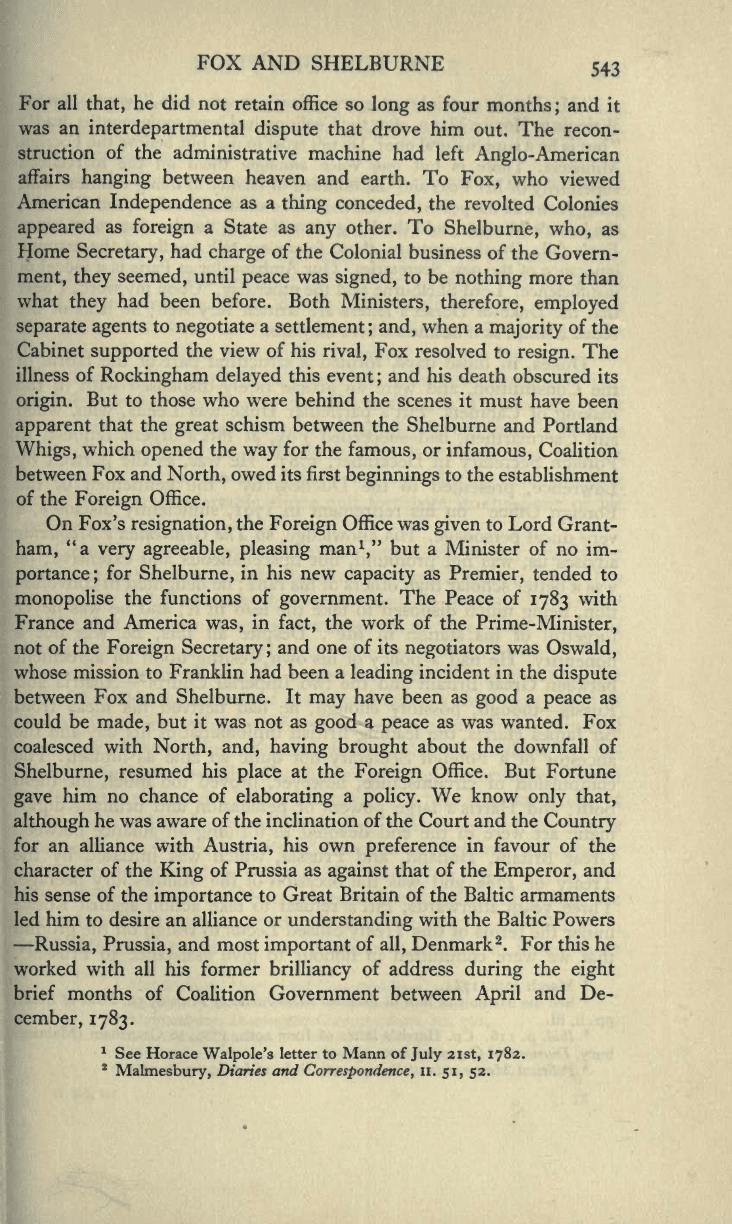
FOX AND
SHELBURNE
543
For
all
that,
he did
not
retain office so
long
as
four
months;
and
it
was
an
interdepartmental
dispute
that drove him
out. The recon-
struction
of
the
administrative
machine had
left
Anglo-American
affairs
hanging
between heaven
and
earth.
To
Fox,
who
viewed
American
Independence
as a
thing
conceded,
the
revolted Colonies
appeared
as
foreign
a
State
as
any
other.
To
Shelburne, who,
as
Home
Secretary,
had
charge
of
the Colonial
business of
the Govern-
ment,
they
seemed,
until
peace
was
signed,
to be
nothing
more
than
what
they
had
been
before.
Both
Ministers,
therefore,
employed
separate
agents
to
negotiate
a
settlement; and,
when a
majority
of
the
Cabinet
supported
the view of his
rival,
Fox
resolved
to
resign.
The
illness of
Rockingham
delayed
this event
;
and
his
death obscured
its
origin.
But
to those
who were behind
the scenes
it
must have
been
apparent
that
the
great
schism
between
the Shelburne and
Portland
Whigs,
which
opened
the
way
for
the
famous,
or
infamous,
Coalition
between
Fox and
North,
owed
its first
beginnings
to the
establishment
of the
Foreign
Office.
On Fox's
resignation,
the
Foreign
Office was
given
to
Lord
Grant-
ham,
"a
very agreeable, pleasing
man
1
,"
but
a
Minister
of no
im-
portance;
for
Shelburne,
in
his
new
capacity
as
Premier,
tended
to
monopolise
the
functions
of
government.
The
Peace of
1783
with
France
and America
was,
in
fact,
the work
of
the
Prime-Minister,
not
of
the
Foreign
Secretary;
and
one
of
its
negotiators
was
Oswald,
whose mission
to
Franklin had
been
a
leading
incident
in
the
dispute
between
Fox and
Shelburne. It
may
have
been
as
good
a
peace
as
could
be
made,
but
it
was
not
as
good
a
peace
as
was
wanted. Fox
coalesced
with
North,
and,
having brought
about the downfall of
Shelburne,
resumed
his
place
at
the
Foreign
Office.
But Fortune
gave
him
no
chance of
elaborating
a
policy.
We
know
only
that,
although
he
was
aware
of
the
inclination
of
the Court
and
the
Country
for an
alliance
with
Austria,
his
own
preference
in favour
of
the
character
of
the
King
of Prussia
as
against
that
of
the
Emperor,
and
his
sense of
the
importance
to
Great Britain
of
the
Baltic armaments
led
him
to desire
an alliance or
understanding
with
the
Baltic
Powers
—
Russia,
Prussia,
and
most
important
of
all,
Denmark
2
.
For
this
he
worked
with
all
his former
brilliancy
of
address
during
the
eight
brief months of
Coalition
Government between
April
and
De-
cember,
1783.
1
See Horace
Walpole's
letter to
Mann of
July
21st,
1782.
2
Malmesbury,
Diaries
and
Correspondence,
11.
51, 52.
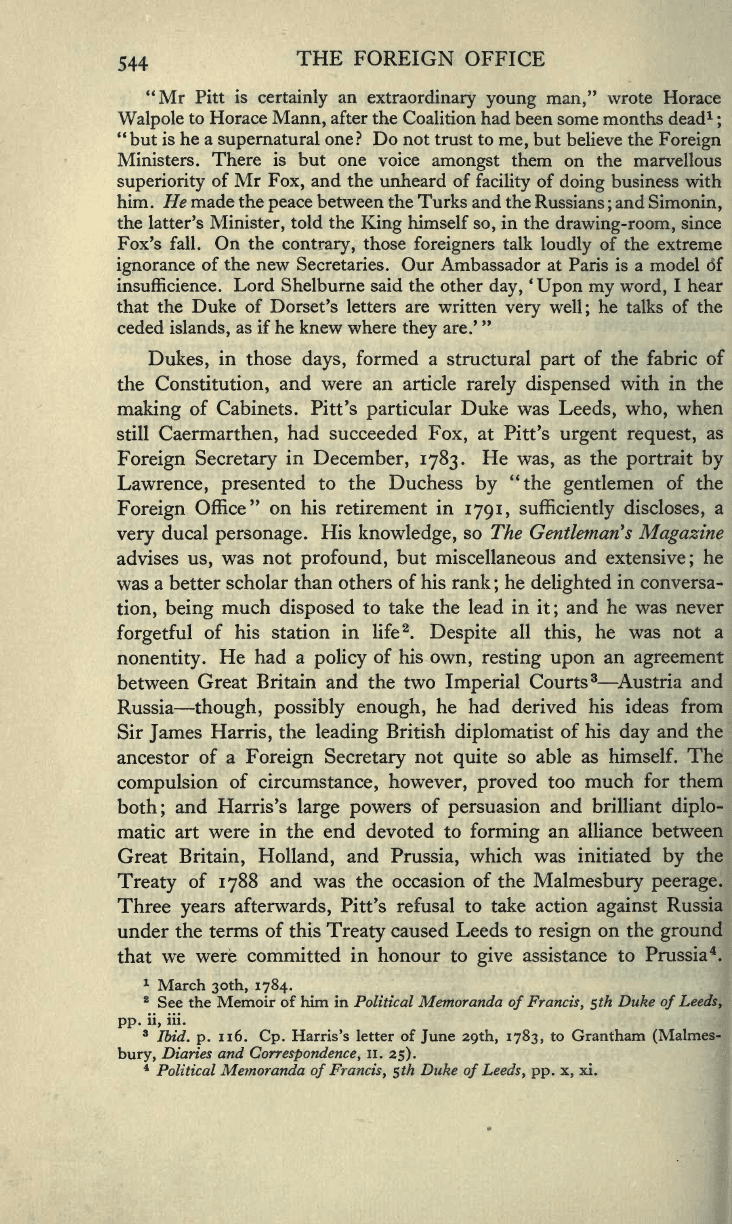
544
THE FOREIGN
OFFICE
"Mr
Pitt
is
certainly
an
extraordinary
young
man,"
wrote
Horace
Walpole
to Horace
Mann,
after
the Coalition
had
been some months
dead
1
;
"
but
is
he
a
supernatural
one? Do not
trust to
me,
but believe
the
Foreign
Ministers.
There
is but one
voice
amongst
them on the marvellous
superiority
of Mr
Fox,
and the
unheard of
facility
of
doing
business
with
him.
He made the
peace
between
the Turks and the
Russians
;
and
Simonin,
the latter's
Minister,
told
the
King
himself
so,
in
the
drawing-room,
since
Fox's fall. On
the
contrary,
those
foreigners
talk
loudly
of the
extreme
ignorance
of the
new Secretaries. Our Ambassador at
Paris is a model
of
insufficience.
Lord
Shelburne
said
the
other
day,
'
Upon
my
word,
I hear
that the
Duke of Dorset's letters are
written
very
well;
he
talks of
the
ceded
islands,
as if he knew
where
they
are.'
"
Dukes,
in
those
days,
formed
a
structural
part
of the
fabric
of
the
Constitution,
and were
an article
rarely
dispensed
with
in
the
making
of Cabinets. Pitt's
particular
Duke
was
Leeds,
who,
when
still
Caermarthen,
had succeeded
Fox,
at Pitt's
urgent request,
as
Foreign
Secretary
in
December,
1783.
He
was,
as
the
portrait
by
Lawrence,
presented
to
the
Duchess
by
"the
gentlemen
of
the
Foreign
Office"
on
his
retirement
in
1791,
sufficiently
discloses,
a
very
ducal
personage.
His
knowledge,
so The Gentleman's
Magazine
advises
us,
was not
profound,
but miscellaneous
and
extensive;
he
was
a
better
scholar than others
of
his
rank
;
he
delighted
in conversa-
tion,
being
much
disposed
to take the
lead
in
it;
and he was
never
forgetful
of
his
station
in
life
2
.
Despite
all
this,
he
was not
a
nonentity.
He
had a
policy
of his
own,
resting
upon
an
agreement
between
Great Britain and the two
Imperial
Courts
3
—
Austria
and
Russia
—
though, possibly enough,
he
had
derived
his ideas
from
Sir
James
Harris,
the
leading
British
diplomatist
of his
day
and
the
ancestor
of a
Foreign Secretary
not
quite
so able as
himself.
The
compulsion
of
circumstance, however,
proved
too
much for them
both;
and
Harris's
large
powers
of
persuasion
and
brilliant
diplo-
matic
art
were
in
the
end
devoted to
forming
an alliance between
Great
Britain, Holland,
and
Prussia,
which was
initiated
by
the
Treaty
of
1788
and was the occasion
of
the
Malmesbury
peerage.
Three
years
afterwards,
Pitt's
refusal
to take
action
against
Russia
under
the terms
of
this
Treaty
caused
Leeds
to
resign
on
the
ground
that
we
were committed
in honour
to
give
assistance
to
Prussia
4
.
1
March
30th, 1784.
2
See the
Memoir
of him in Political Memoranda
of
Francis,
$th
Duke
of
Leeds,
pp.
ii,
iii.
3
Ibid.
p.
116.
Cp.
Harris's
letter
of
June
29th,
1783,
to
Grantham
(Malmes-
bury,
Diaries
and
Correspondence,
11.
25).
4
Political
Memoranda
of
Francis,
$th
Duke
of Leeds,
pp.
x,
xi.
